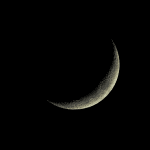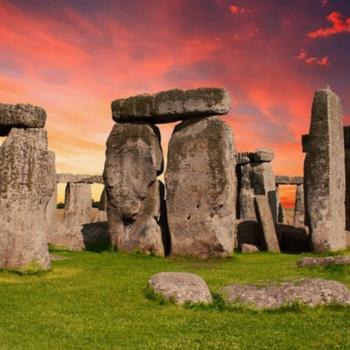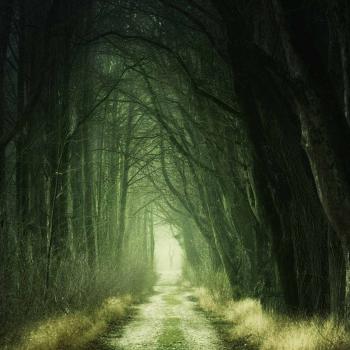There’s a movement of people in contemporary America who long to connect with the gods of their ancestors, who feel the myths in their blood and the calling to their homelands within their spirits. It’s difficult to know where to begin, so many turn to the legends and sagas of the Norse and Celts, the Greeks and the Romans, hoping to find connection there. We’ve been told for so long that the gods of old are dead, but in our hearts we know better. We don’t necessarily understand the context of their myths or the cultures surrounding them, how to connect with the gods today through those myths, or the influence of the Christian scholars who wrote down the myths (specifically of the Norse and Celtic peoples), so the disconnect continues even as Reconstructionism gains in popularity.
American society has a heavy Christian influence whether we want it to or not, and this influence affects the polytheists who want to reconnect with the Ancient Ones. I don’t know how many times I’ve heard that the Bible is the only way to know God, so I imagine many others have heard this repeatedly as well, and as a result this mindset carries over when folks turn to polytheism and it leaves people wanting because the stories of the Ancient Ones are really not enough. They aren’t enough to build a relationship on, they aren’t enough to build a devotional practice around, they aren’t enough to feel relevant to where we are today, and they aren’t enough to break through into the understanding that the Ancient Ones are alive and acting today. We must discard the belief that the words of others before us are the only real way to the know the gods, and that what was known before is the end of all revelation.
Trying to reconstruct the practices of the polytheists of old is not necessarily going to bring fulfillment today, either. We live in a different world now. We need to connect with the gods as they are today, as they reveal themselves to us, today. We need to develop devotional practices that fit our lives and circumstances today. Connecting with them in the here and now, as they are here and now, is necessary for a real devotional practice that forges true connection and brings fulfillment through these relationships. We can know certain things about them based on the stories of old, but we should not hold them to those stories or pretend that they are are not beyond those stories. We cannot ignore the Christian influence of many of those stories, either. Learning the history of our ancestors and the lands our ancestors came from is a necessary step in learning to connect with the gods of old without the veil of Christian influence. Releasing the Christianized view of them by understanding, as best as we can, the worldview of our ancient ancestors is also important for a true connection to be made.
Many of our ancestors were animists without the dualistic mindset of good vs evil. The dualistic mindset of good and evil doesn’t really have a place in polytheism. The clear line of good and evil is not a polytheist construct, it’s a Christian one. Nothing in existence fits clear labels such as this, everything is more complex than these simple labels. Everything serves a purpose. We may not like the purpose that some things serve, but that doesn’t automatically make them evil. We can look to nature and see that the ability to harm or help exists in literally everything, and how we relate to the spirits around us plays a big role in how they may act toward us. Releasing this dualistic mindset will help to reconcile the complex character of the gods, and learn to appreciate and accept those with more challenging aspects for the necessary work that they do.
It’s imperative for a polytheistic practice that will grow with you as you grow, to release the fear of personal gnosis and begin trusting your experiences. It’s necessary to release expectations of how the gods will communicate, what they may appear to look like, what their personalities will be like, in order to really get to know them. When I first began my relationship with Loki he told me not to research him. He wanted me to know him here and now, as he revealed himself to me. Going off of the stories other people have written without an open mind to what the gods may reveal themselves is like believing gossip and letting that be the basis for how you view the gods. It’s shitty to prejudge anyone in this way. What actually matters when you get down to it is how then gods reveal themselves to you and the way that they move in your life, not what others have said about them. Other peoples’ beliefs and experiences can’t substitute for your own, nor are they more legitimate than your own. The old stories aren’t useless by any means, and they can definitely serve as a foot in the door to building a connection, but we don’t have to pretend like that’s all that’s available to us.
Building a polytheistic practice on personal gnosis is a lot easier and more fulfilling than trying to build a practice on fragmented stories and the way people maybe did things at one point in time in a culture that no longer exists where life was much different than it is today. The gods themselves will tell you what offerings they like, and what days are good for devotional rituals. Some of the information from contemporary polytheists who have a solid practice can also be helpful for building a practice around as well. There are loads of resources and for the practice to flourish, and an open heart and mind will put you much further ahead than keeping a death grip on the past and clinging to rose-colored ideologies of the way things were.
For more witchy content subscribe to this blog and follow me on Facebook.
Featured image via pixabay.
















